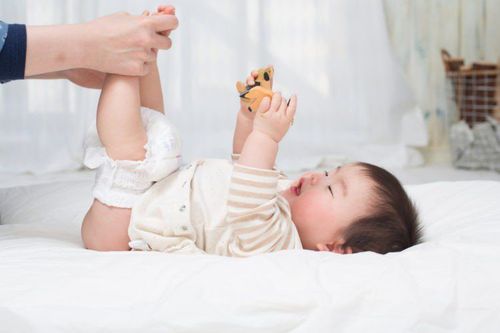The body of a newborn frequently changes to adapt to the surroundings. When parents see yellow urine in their newborn, they often worry about their child's health and wonder what might cause the yellow color in their urine.
1. Reasons for yellow urine in newborns
Newborn urine being yellow typically results from two factors: nutrition and medical conditions. If the yellow urine is due to nutritional reasons, it's usually a normal sign, and parents need not worry.
However, if the yellow urine is a result of a medical condition, parents should take their child to a medical facility for examination, diagnosis, and appropriate treatment.

1.1 Nutritional causes
- The baby may not be getting enough milk, resulting in more concentrated urine.
- When breastfeeding: if the baby is getting enough milk, they will feed for about 10 to 15 minutes, then sleep soundly and wake up after 3 hours to feed again. During the ages of 2 to 6 months, babies typically gain 20-25 grams per day. Therefore, weighing the baby at the same time each day helps determine if they are getting enough milk and if not, the feeding should be increased.
- When bottle-feeding: at this age, it’s recommended that babies consume about 150ml of milk per kg of body weight per day.
- If the mother is taking medications that have a yellow color, the breast milk may cause the baby’s urine to appear yellow.
- If the mother consumes foods containing yellow food coloring, the baby's urine may also turn yellow.
1.2 Medical causes
- Newborn jaundice is the most typical condition that causes urine to appear yellow in infants. This phenomenon is common, especially in preterm infants. However, certain serious medical conditions can also lead to yellow urine, such as:
- Congenital hepatitis: The liver filters and eliminates toxins from the body. Damage to the liver affects its function, leading to a buildup of toxins, which changes the color of the urine.

- Hereditary hemolytic diseases: This can be due to inherited blood disorders, G6PD deficiency, or abnormal hemoglobin (like Thalassemia).
- Medications: Some medicines taken by the mother may cause jaundice by triggering hemolysis in certain metabolic diseases.
- Bile duct obstruction: This blockage may occur due to acute hemolysis causing bile blockage in the liver or congenital bile duct issues.
There are many other reasons that can cause yellow urine in newborns, and tests are necessary to determine the exact medical condition.
2. Diagnosis through urine color
In the first few weeks, changes in the urinary output of newborns occur continuously, from infrequent urination to frequent urination and from clear to yellow urine.
The yellow color of urine is often a major concern for mothers who fear it may indicate a medical problem.
Therefore, it is important to distinguish between different shades of yellow urine to make an accurate assessment:
- Light yellow urine: This indicates that the baby’s health is completely normal. If they are feeding well, the number of wet diapers will increase, and the urine will have a light yellow color resembling the first water that rinse tea leaves.

- Dark yellow urine: If the baby is being fed normally and not consuming many yellow foods (like turmeric or carrots) or medications, but their urine is still dark yellow, it indicates potential dehydration. If there are signs like a sunken or hollow forehead, it may mean severe dehydration, and promptly hydration is crucial.
- Dark urine like concentrated tea: This may indicate not only dehydration but also possible diseases like hepatitis, cholecystitis, or kidney stones. If the dark urine persists, parents should take the baby to a doctor for timely diagnosis and treatment.
Thus, if a newborn's urine appears yellow, parents should not panic but instead observe and differentiate the shades of yellow. If unusual signs occur, it is essential to take the baby to a pediatric department in a hospital or medical center for doctors to determine the cause and provide prompt treatment.
To arrange an appointment, please call HOTLINE or make your reservation directly HERE. You may also download the MyVinmec app to schedule appointments faster and manage your reservations more conveniently.





